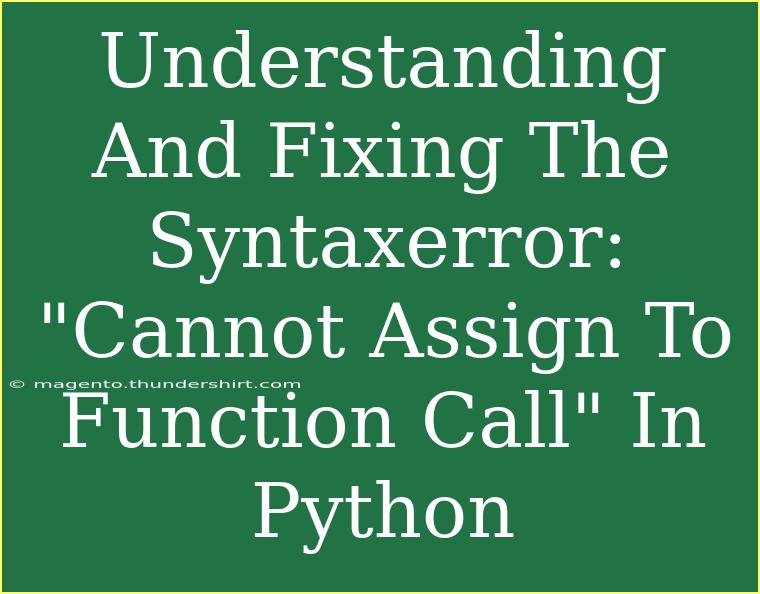In Python, you may come across various error messages while coding, and one particularly perplexing error is the SyntaxError: "cannot assign to function call." This error can leave even seasoned programmers scratching their heads. Don’t worry, though! This article will demystify this error, explore its common causes, and provide you with effective solutions to avoid it in your future programming endeavors.
What Is SyntaxError in Python? 🤔
Before diving into the specifics of the "cannot assign to function call" error, let’s take a moment to understand what a SyntaxError is. In Python, a SyntaxError occurs when the code does not conform to the language’s syntax rules. Essentially, this error means that Python cannot interpret the statement you’ve written, thus halting the execution of your program.
The error message “cannot assign to function call” specifically indicates that you are trying to assign a value to something that’s not a valid target for assignment. Let’s take a closer look at what could be causing this problem.
Common Causes of the SyntaxError: "Cannot Assign To Function Call"
-
Misunderstanding Function Calls:
One of the most common reasons for this error is confusing function calls with variable assignments. In Python, you cannot assign a value directly to the result of a function call since it doesn’t represent a variable location where data can be stored.
def my_function():
return 10
my_function() = 5 # This will raise SyntaxError
In this example, the function call my_function() is being treated as a variable to which you’re trying to assign the value 5, which is not allowed.
-
Using Function Return Values Incorrectly:
This error can also occur when trying to assign a value to the return value of a function rather than using it in an expression.
def multiply(a, b):
return a * b
multiply(2, 3) = 6 # This will raise SyntaxError
-
Chain Assignments with Function Calls:
Trying to perform chain assignments that involve a function call will also result in this error.
def return_one():
return 1
return_one() = return_one() # SyntaxError here
How to Fix the SyntaxError: "Cannot Assign To Function Call"
Step 1: Revisit the Code
Go through the sections of your code that produce this error. Look for lines where you might be attempting to assign a value to a function call. Remember, function calls return values, but they can’t be assigned values directly.
Step 2: Use Variables Properly
Instead of attempting to assign a value to a function call, store the result of the function in a variable first and then use that variable.
Example:
# Incorrect
result = my_function() = 5 # SyntaxError
# Correct
value = my_function() # Store the result of the function call
Step 3: Refactor Your Logic
If you are doing complex assignments or calculations, consider breaking them down into simpler steps to avoid ambiguity.
Example:
# Incorrect
multiply(2, 3) = 6 # SyntaxError
# Correct
result = multiply(2, 3)
if result == 6:
print("Correct!")
Step 4: Testing Your Fixes
After making your changes, rerun your code to see if the error has been resolved. Use Python’s built-in debugging tools like pdb or simply print statements to check the flow of your program.
Common Mistakes to Avoid
-
Assuming Function Calls Can Be Targets: Remember that function calls return values and should never be treated as variables.
-
Confusing Assignment with Comparison: Be careful when using the = operator. It is meant for assignment, while == is for comparison.
-
Ignoring the Error Message: Always read error messages carefully—they usually provide hints about the line of code that caused the issue.
Troubleshooting SyntaxError: "Cannot Assign To Function Call"
If you encounter this error, here are some troubleshooting steps to follow:
- Review the Line Number: Look for the exact line number the error points to. Often, you can identify the issue immediately.
- Check Syntax Carefully: Review your code for any syntax issues that might not be directly related to the assignment.
- Run Small Code Snippets: Isolate the problematic lines in smaller test cases to see if you can reproduce the error.
<div class="faq-section">
<div class="faq-container">
<h2>Frequently Asked Questions</h2>
<div class="faq-item">
<div class="faq-question">
<h3>What does "cannot assign to function call" mean?</h3>
<span class="faq-toggle">+</span>
</div>
<div class="faq-answer">
<p>This error means you are trying to assign a value to a function call, which is not allowed in Python. You cannot assign a value directly to a function's output.</p>
</div>
</div>
<div class="faq-item">
<div class="faq-question">
<h3>How can I avoid this error?</h3>
<span class="faq-toggle">+</span>
</div>
<div class="faq-answer">
<p>To avoid this error, make sure to store the result of a function call in a variable rather than trying to assign a value directly to it.</p>
</div>
</div>
<div class="faq-item">
<div class="faq-question">
<h3>Can I assign the result of a function to another variable?</h3>
<span class="faq-toggle">+</span>
</div>
<div class="faq-answer">
<p>Yes, you can assign the result of a function to a variable, which you can then use later in your code.</p>
</div>
</div>
</div>
</div>
In summary, encountering the SyntaxError: "cannot assign to function call" in Python is common, especially when starting out or when your code becomes complex. By understanding the error's causes and implementing the provided fixes, you can navigate this issue effectively. Remember to utilize variables correctly, refactor your logic when needed, and avoid common pitfalls.
As you continue your Python journey, don’t hesitate to practice using function calls and assignments to solidify your understanding. Exploring related tutorials will deepen your comprehension and ability to troubleshoot issues as they arise. Happy coding!
<p class="pro-note">🛠️Pro Tip: Always remember that function calls return values; they should never be treated as variables for assignment.</p>
